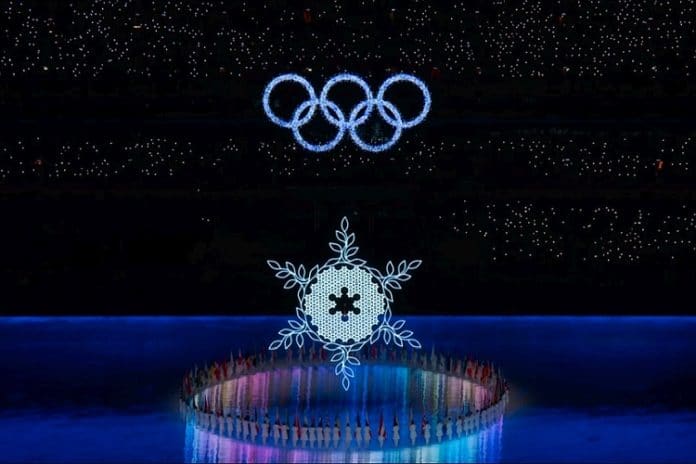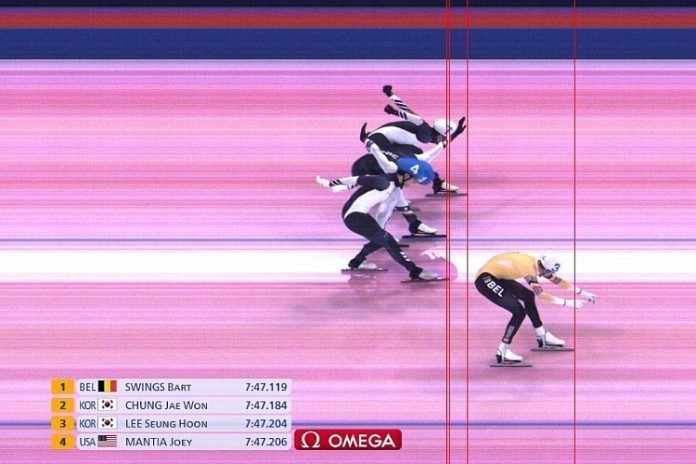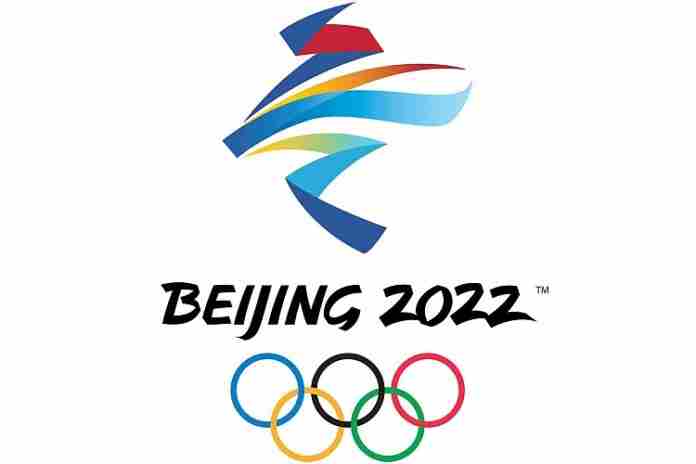(★ Friends: Bravo! Thank you to our 28 donors, who have covered 50% of our site costs for services for the first six months of 2022. If you would like to add your support, please donate here. ★)
= BEIJING 2022 =
From Lane One
The spectacular ending fireworks about the Bird’s Nest stadium in Beijing spelled out “One World One Family” in the winter air as the XXIV Olympic Winter Games closed on Sunday evening.
International Olympic Committee President Thomas Bach of Germany praised the host country and especially the more than 18,000 volunteers who staffed the Games, saying in his remarks:
“The Olympic Villages were outstanding. The venues – magnificent. The organisation – extraordinary. …
“This unforgettable experience was only possible because of our gracious hosts, the Chinese people. With over 300 million people now engaged in winter sports, with the great success of the Chinese athletes, the positive legacy of these Olympic Games is ensured.
“With the truly exceptional Olympic Winter Games Beijing 2022 we welcome China as a winter sport country.”
His eight-and-a-half-minute speech also went where the IOC tells everyone not to go: into politics. With an eye toward the seemingly imminent conflict between Russia and Ukraine, he said to the assembled athletes:
“You not only respected each other. You supported each other. You embraced each other, even if your countries are divided by conflict.
“You overcame these divisions, demonstrating that in this Olympic community we are all equal. We are all equal – regardless of what we look like, where we come from, or what we believe in.
“This unifying power of the Olympic Games is stronger than the forces that want to divide us: you give peace a chance.
“May the political leaders around the world be inspired by your example of solidarity and peace.”
He added:
“If we want to finally overcome this pandemic, we must be faster, we must aim higher, we must be stronger – we must stand together.
“In this Olympic spirit of solidarity, we call on the international community: give equal access to vaccines to everybody around the world.”
The show itself marched along at a steady pace and took only an hour and 47 minutes from start to finish. The floor of the stadium was once again covered in a spectacular “screen” with imposing lighting effects throughout, thoroughly enjoyed by spectators that filled perhaps 25% of the stadium.
The giant snowflake which was the centerpiece of the Opening Ceremonies was back, as were the legions of dancers, with the Olympic Torch in the middle of the snowflake turned off to mark the end of the Games.
There will be plenty of time for commentary, but the Beijing Games have closed in what was a mostly-safe, if necessarily sterile environment due to the pandemic and China’s zero-tolerance approach that kept the virus controlled.
The Winter Paralympic Games will follow on 4 March; the IOC announced that Bach communicated to the International Paralympic Committee that he will not attend the event. IOC Vice President Ser Miang Ng (SGP) will be the representative.
¶
Russian Presidential spokesman Dmitry Peskov reacted to Bach’s distaste for the way skater Kamila Valieva was treated by her coaches, saying during a Friday conference call with reporters:
“Thomas Bach is a very authoritative person in the sports world. Of course we respect his opinion but we do not necessarily agree with him.
“He doesn’t like the harshness of our coaches but everybody knows that the harshness of a coach in high-level sport is key for their athletes to achieve victories.
“And we are seeing that the athletes are achieving victories. So let’s be proud of our winners, congratulate our medalists. Valieva was fourth but in high-level sport, the strongest wins.”
When considering Russia’s place in sport and in the world, that’s a comment worth remembering.
¶
Reuters reported that U.S. figure skaters Alexa Knierim and Brandon Frazier have been sued for unauthorized use of Heavy Young Heathens’ version of “House of the Rising Sun” in their Short Program performance in Beijing.
The filing is in the U.S. District Court for the Central District of California, and is the latest in a series of suits against alleged infringers of their copyright. The complaint also alleges an infringement by NBC for broadcasting the song as part of the event.
¶
The Olympic Covid incidence report for 19 February showed one positive, with none at the airport (13 arrivals), but one athlete or team official among 4,223 tests and none from 62,714 total tests inside the closed loop for other stakeholders..
The totals are 185 total positives (arrivals and inside the closed loop) among athletes and team officials and 324 among all other stakeholders since the closed loop began operations on 4 January.
The U.S. Olympic & Paralympic Committee reported Saturday that there were no new cases among the 460 delegates in Beijing, with no one in isolation.
¶
Sorry to repeat once again: no ratings report from NBC, this time on its Friday primetime broadcast, the seventh day in the last eight without any information.
Using NBC’s data plus TSX estimates for Friday and Saturday of the first week, the first 10 days of the Games (not counting the pre-Games telecast), had an average primetime total audience of 13.3 million.
That’s down 33% from the nightly average of 19.8 million for the PyeongChang Games in 2018 and down from the 15.1 million nightly primetime average for the Tokyo Games last summer.
More data will be available early this week.
¶
Norway completed another brilliant Games, finishing with 37 medals, including 16 golds – an all-time Winter Games record – plus eight silvers and 13 bronzes. That’s tied for the second-highest total ever with the U.S. from 2010.
Russia completed a sensational effort with 32 medals (6-12-14), no. 6 on the all-time list, its most medals ever in a Winter Games.
Germany stood third in the medal count with 27 (12-10-5), followed by Canada (26: 4-8-14), with the U.S. at 25 – two more than in 2018 – with eight golds, 10 silvers and seven bronzes.
The all-time best medal totals in a single Winter Games:
1. 39, Norway in 2018
2. 37, United States in 2010 and Norway in 2022
4. 36, Germany in 2002
5. 34, United States in 2002
6. 32, Russia in 2022 (at present)
7. 31, Germany in 2018
8. 30, Germany in 2010 and Russia in 2014 (at present)
The results of the Figure Skating Team Event are, of course, still to be finalized. For now, the medals went to Russia, the U.S. and Japan, with Canada fourth. The ultimate decision on the doping positive for Valieva could change that.
The medal table tells only part of the story. For a deeper comparison of team strength, here are our TSX scoring rankings, using the top eight places, via the time-honored U.S. scoring of 10-8-6-5-4-3-2-1. So after all 109 events:
1. 415, Norway
2. 394, Russia
3. 369, United States
4. 340, Germany
5. 312, Canada
6. 270, Austria
7. 225, Sweden
8. 217, Italy
9. 211, Netherlands
10. 206, China
11. 205, Japan
12. 203, Switzerland
Compared to 2018, the Norwegian point total was down a bit from 441 1/2, but Russia was way up from 200 points with a limited team. The U.S. also did well, up from 357 1/2 points four years ago. The Germans were down from 377 1/2 points, and Canada was short of the 352 points in PyeongChang.
~ Rich Perelman
= RESULTS: SUNDAY, 20 FEBRUARY =
● Alpine Skiing: Mixed Team Parallel Event
Winds and freezing temperatures were still an issue, but the alpine Mixed Team was conducted on Sunday, with Austria defeating Germany for the gold and Norway edging the U.S. for the bronze.
The format was four parallel Slalom races – two for men and two for women – with the combined times of the wins breaking any ties.
The U.S. fielded a strong quartet of River Radamus, Tommy Ford, Mikaela Shiffrin and Paula Moltzan, and ran past Slovakia, 3-1, in their first-round match and moved on to face Italy in the quarterfinals. That was another win, again by 3-1, with Shiffrin losing by 0.02 to World Cup stalwart Marta Bassino.
That brought up the semifinals, with the U.S. vs. Germany and Austria vs. Norway. The Austrians and Norwegians tied, 2-2, but Austria advanced on the combined of its two wins, 48.28, to 48.89.
Germany skied past the Americans, 3-1, with only Radamus winning his race, so the U.S. faced Norway in the bronze-medal match.
Moltzan won against Maria Tviberg (+0.74), then Fabian Solheim beat Ford (+0.94), and Shiffrin lost her third straight race, this time to Theo Louise Stjernesund (+0.52), and Radamus won as Timon Haugen did not finish. The 2-2 tie was broken in Norway’s favor on time: 48.34 to 48.76, giving them the bronze and sending the U.S. home empty-handed.
The championship final was another tight one, with Lena Duerr and Alexander Schmid winning their matches for Germany and Stefan Brennsteiner and Katharina Liensberger winning for Austria. The time calculation favored Austria, 48.27-48.46, giving them their third gold and seventh alpine medal of the Games, with Johannes Strolz winning his third (2-1-0) and Liensberger her second (1-0-1).
Shiffrin skied in all six events, and Olympic super-historian Bill Mallon (USA) notes she is the fifth skier to do so, after four skied all six in 2018. After all of her Beijing trials and tribulations, she is still the seasonal leader in the FIS World Cup and the season will resume on 26 February for a Downhill at Crans-Montana (SUI).
Yes, there is life beyond Beijing.
● Bobsled: 4-man
Germany’s sleds were 1-2-4 after the first two runs, led by Two-Man winner and defending Four-Man Olympic champ Francesco Friedrich, ahead of Johannes Lochner (GER: +0.03), Canada’s Justin Kripps (CAN: +0.38) and Two-Man bronze medalist Christoph Hafer (GER: +0.55).
Friedrich won the third heat in his fastest time of the Games – 58.17 – and extended his advantage to 0.20, with Kripps and Hafer staying 2-3.
The four run looked a lot like the third, with Friedrich again the fastest (59.13) and wrapping up a double-double, winning the 2/4 double in both PyeongChang and Beijing.
Hafer’s sled actually had the second-fastest time in the final run at 59.25, followed by Kripps at 59.27. That meant Lochner had to be at 59.42 or faster to get the silver and his 59.30 was more than sufficient.
Friedrich’s total was 3:54.30, with Thorsten Margis, Candy Bauer, and Alexander Schueller aboard, 37/100ths ahead of Lochner (3:54.67) and 79/100ths ahead of Kripps (3:55.09). Those are considered healthy margins in the unyielding sport of bobsled.
Friedrich’s 2018-22 golden double-double is a first. Fellow German Andre Lange was the closest: won the Four-Man in 2002 and 2006 and the Two-Man in 2006 and 2010. (Please note: Friedrich tied with Kripps for gold in the 2018 Two-Man.)
The U.S. had two sleds in: Hunter Church moved up from 13th to 10th overall on the second day (3:57.06) and Fred Del Duca rose from 15th to 13th (3:57.65).
● Cross Country Skiing: Women’s 30 km Mass Start Freestyle
The favorite was Norway’s Theresa Johaug and she won in style in what she says is her last Olympic race, leading from the start and finishing more than a minute and a half in front in 8-degree (F) with windy conditions and blowing snow on the course.
Her final time was 1:24:54.0 and she celebrated a sweep of the distance events in Beijing, taking the 10 km Classical, 15 km Skiathlon and the 30 km Free. At 33, she now owns a career total of six Olympic medals from 2010-22: four gold, one silver and one bronze. She is one of the great distance skiers of all time.
More startling was what was going on behind her, with American Jessie Diggins, better known as a sprinter – and the Freestyle Sprint bronze medalist in Beijing – following Johaug’s attack after 9 km to also break away from the rest of the field and skate alone for the rest of the race. Diggins had a 48.4-second advantage over the field by halfway and extended it from there.
She lunged across the finish line in 1:26:37.3 and promptly collapsed in the snow, being bundled up by the medical staff and carried off for medical attention (she was fine).
The fight for third was tight, with Sweden’s Ebba Andersson leading most of the way, but she was passed on the final lap, with Finn Kerttu Niskanen crossing ahead of fast-closing Jonna Sundling (SWE), Russia’s Tatiana Sorina and American Rosie Brennan: 1:27:27.3-1:27:29.4-1:27.31.2-1:27:32.7. That’s 5.4 seconds from third to sixth after 18.6 miles.
JESSIE DIGGINS!
Until PyeongChang in 2018, the U.S. had won a total of one medal in Olympic Cross Country: Bill Koch’s 1976 silver in the 30 km. Diggins and Kikkan Randall broke through in PyeongChang and won the Team Sprint. In many ways, her follow-up in Beijing is even more remarkable: her Freestyle Sprint bronze was not a surprise, but to see her in the ultimate distance race as the silver medalist is the opening to an entirely new chapter in American distance skiing. She is now the only American to win multiple medals in Olympic Cross Country and now owns a full set: gold (‘18), and silver and bronze (‘22).
Diggins, 30, had shown promise in the longer distances, finishing seventh in this race in PyeongChang and fourth in the 2019 World Championships. But this time she dusted everyone other than an all-time great in difficult conditions at the Olympic Games. Just sensational.
Brennan, 33, was also superb in sixth, up from 16th in this race at the 2019 Worlds and in the fight for the bronze well into the final lap.
● Curling: Women’s final
Eve Muirhead’s British squad got out in front early and stayed there for a decisive 10-3 win over Japan in the gold-medal match in women’s curling.
The all-Scotland squad, with Muirhead as skip, took a 2-0 lead after the first end and held a 4-2 edge after six ends. But the match was decided with a four-point end for the Scots in the seventh end and two more in the ninth. Satsuki Fujisawa’s team scored one point in the eight, but had to settle for the silver.
The score was almost the same as their group match, where Britain won by 10-4.
It’s the second Olympic medal for both skips, as Muirhead owns a 2014 Sochi bronze and Fujisawa led bronze-medalist in 2018.
Anna Hasselborg’s Sweden team won the bronze medal by defeating two-time defending World Champion Silvana Tirinzoni and Switzerland, 9-7.
● Ice Hockey: Men’s final
The Russia-Finland championship final figured to be a struggle, and it was. But it ended with history.
Russia, the defending champions from 2018, took a 1-0 lead in the first period, as Mikhail Grigorenko scored from just inside the blue line on the power play at 7:17. Russian keeper Ivan Fedotov turned away 15 Finnish shots, compared for six saves in seven shots on Harri Sateri.
Finland got even just 3:28 into the second period on a Ville Pokka goal, also on a long-distance shot, in front of a screened Fedotov. That was the only score of an closely-played period.
But the Finns took charge in the final period, and took a 2-1 lead just 31 seconds in, as Hannes Bjorninen deflected a hard shot by Marko Antilla from the middle of the Russian zone, past Fedotov and into the net.
And from there, the Russians could do nothing. Finland fore-checked, harassed the Russian attack and held the puck for long stretches, not just hanging on, but controlling the game. The Russians had only three shots on goal during the period and because the Finns controlled possession, Russia could not pull Fedotov for an extra skater until less than a minute remained.
Finland ran out the clock and exploded with joy around Sateri, having completed an undefeated Olympic tournament and out-shooting the Russians in the key final period, 9-3.
Finland had won four Olympic bronzes and seemingly could never get past Russia or Canada or the U.S., but won its first Olympic title after silvers in 1988 and 2006.
Slovakia won the bronze medal by beating Sweden on Saturday, holding a 2-0 lead until the final couple of minutes and then scoring two empty-net goals for the 4-0 final.
= BEYOND BEIJING =
● XXVI Olympic Winter Games: 2030 ● Believe it or not, Ukrainian Sports Minister Vadym Huttsait told his Parliament that a bid for the 2030 Winter Games is being prepared.
Staging the Games would require significant infrastructure work, but the planning is continuing.
Very, very brave.
● Football ● The second day of the SheBelieves Cup is today in Carson, California, with the U.S. women playing New Zealand at noon Pacific time and Iceland facing the Czech Republic at 3 p.m. The U.S. game will be shown on ABC and Prende TV.
The U.S. and the Czechs played to a scoreless tie and Iceland defeated New Zealand, 1-0, in the opening matches.
● Judo ● France dominated the women’s classes at the IJF World Tour stop in Israel, winning four golds at the Tel Aviv Grand Slam.
The winners include Shirine Boukli at 48 kg, Astride Gneto at 52 kg, sister Priscilla Gneto at 57 kg (she’s the one who had her mobile phone fall out of her gi during the Paris Grand Slam) and Romane Dicko at +78 kg.
The Israeli crowd went wild with the 66 kg class win by Baruch Shmailov; Olympic bronze medalist Matthias Casse (BEL) won at 81 kg and Georgia’s Olympic silver winner Guram Tushishvili (GEO) won at +100 kg.
You can receive our exclusive TSX Report by e-mail by clicking here. You can also refer a friend by clicking here, and can donate here to keep this site going.
For our 832-event International Sports Calendar for 2022 and beyond, by date and by sport, click here!























